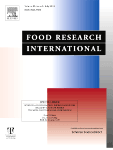
FOOD RESEARCH INTERNATIONAL
Scope & Guideline
Elevating Standards in Food Science Research
Introduction
Aims and Scopes
- Food Composition and Nutritional Analysis:
Research on the chemical composition of various food products, including the identification and quantification of bioactive compounds, vitamins, and minerals. - Food Processing Technologies:
Studies exploring innovative processing methods (e.g., high-pressure processing, ultrasound, and fermentation) that enhance food quality, safety, and nutritional value. - Microbiology and Food Safety:
Investigations into microbial communities in food systems, their roles in fermentation, spoilage, and foodborne pathogens, along with strategies for enhancing food safety. - Sensory Science and Consumer Preferences:
Research on sensory attributes and consumer perceptions of food products, including studies on flavor, texture, and overall acceptability. - Functional Foods and Health Benefits:
Exploration of the health-promoting properties of foods, including studies on prebiotics, probiotics, and bioactive compounds, and their effects on human health. - Food Innovation and Sustainability:
Research focused on the development of novel food products, waste valorization, and sustainable practices in food production and processing.
Trending and Emerging
- Plant-Based and Alternative Proteins:
Significant interest in research related to plant-based proteins and their applications in food products, reflecting the growing demand for vegetarian and vegan options. - Microbiome and Gut Health:
Emerging studies examining the role of food and dietary components in modulating gut microbiota and their implications on health, including links to chronic diseases and metabolic health. - Food Waste Reduction and Valorization:
Research focused on sustainable practices, including the valorization of food waste through innovative processing techniques and the development of functional ingredients. - Nanotechnology in Food Applications:
Increasing exploration of nanotechnology for improving food properties, such as stability and bioavailability of nutrients, and the development of novel food packaging solutions. - Personalized Nutrition:
A rise in studies investigating how individual dietary needs can be met through tailored food products, reflecting broader trends in health and wellness. - Functional Ingredients and Health Claims:
Growing emphasis on the identification and application of functional ingredients that provide health benefits, including studies on their mechanisms of action.
Declining or Waning
- Traditional Food Fermentation:
Although still relevant, the number of studies solely focused on traditional fermentation methods has decreased as attention shifts towards more innovative fermentation techniques and their microbiological implications. - Basic Food Chemistry:
Research that does not directly link to health outcomes or innovative applications is becoming less common, as the journal increasingly favors studies with clear implications for food safety, quality, or consumer health. - Conventional Packaging Methods:
The exploration of traditional packaging methods is declining as the field moves towards studies on sustainable packaging innovations and their impact on food preservation. - Single Ingredient Studies:
Research focusing exclusively on the properties of single ingredients without considering their application in food systems or their interactions with other components is less frequently published. - Historical Food Practices:
There is a notable decline in studies that focus solely on historical food practices or regional cuisines without a clear connection to modern food science or consumer trends.
Similar Journals
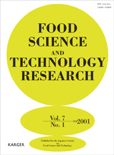
FOOD SCIENCE AND TECHNOLOGY RESEARCH
Advancing Food Innovation and SafetyFOOD SCIENCE AND TECHNOLOGY RESEARCH, published by the Japanese Society of Food Science & Technology, is a pivotal journal that encompasses a wide spectrum of research in the fields of food science, biotechnology, and engineering. With its ISSN number 1344-6606 and a digital counterpart E-ISSN 1881-3984, this journal aims to disseminate cutting-edge research and innovative technologies that enhance food safety, quality, and sustainability. Recognized for its contributions, it holds a Q3 category ranking in multiple disciplines, including Food Science and Biotechnology, indicating a significant role in advancing academic discourse. Researchers and professionals can benefit from its insights, as the journal covers an array of topics relevant to industrial applications, marketing strategies, and scientific advancements. Although not an open-access journal, it has a wide reach and is committed to providing high-quality, peer-reviewed content essential for scholars and practitioners in the food science community from 1999 to 2024.

Acta Scientiarum Polonorum-Technologia Alimentaria
Unveiling Cutting-Edge Discoveries in Food ScienceActa Scientiarum Polonorum-Technologia Alimentaria, published by Poznan University of Life Sciences, is a revered journal in the field of food science, showcasing cutting-edge research and innovations in food technology. Established as a leading platform within its domain, this journal is indexed under Scopus and ranks in the 2023 Q3 quartile for Food Science, demonstrating its commitment to high-quality scholarship. With an ISSN of 1644-0730 and E-ISSN 1898-9594, it serves as a critical resource for researchers, professionals, and students seeking to stay at the forefront of advancements in food safety, quality control, and sustainable practices. The journal has also been recognized for its contributions to the agricultural and biological sciences, positioning itself at rank #205 out of 389 in this competitive field. While currently not offering open access, the journal's valuable insights and findings, especially as it publishes through 2024, play a crucial role in advancing knowledge and fostering collaboration among experts in the food science sector.

Journal of Food and Nutrition Research
Transforming Food Science into Nutritional KnowledgeJournal of Food and Nutrition Research, published by the VUP FOOD RESEARCH INST in Bratislava, Slovakia, serves as a vital platform for disseminating cutting-edge research in the fields of food science and nutrition. With an ISSN of 1336-8672 and an E-ISSN of 1338-4260, this journal emphasizes the importance of interdisciplinary approaches to address contemporary challenges related to food quality, dietary practices, and nutritional health. Notably recognized in the 2023 Scopus rankings, the journal is classified in Q3 quartiles for both Food Science and Nutrition & Dietetics, providing a forum for researchers aiming to enhance knowledge and practices within these domains. Those engaged in academia and industry will find the journal invaluable for its comprehensive scope, which covers novel food technologies, nutrition interventions, and the implications of dietary behaviors. Though not open access, the journal is dedicated to enriching the academic conversation and contributing to advancements in public health and nutrition policies.
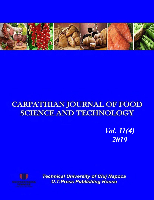
Carpathian Journal of Food Science and Technology
Exploring Culinary Frontiers Through ResearchCarpathian Journal of Food Science and Technology, a distinguished publication from the NORTH UNIV CENTER BAIA MARE, has been a pivotal platform for disseminating groundbreaking research in the field of food science since its inception in 2009. With an ISSN of 2066-6845 and an E-ISSN of 2344-5459, this Open Access journal aims to promote knowledge and innovation, offering unrestricted access to its content, thereby enhancing visibility for authors and facilitating a wider readership. Based in Romania, the journal plays a crucial role in advancing scientific inquiry within the agricultural and biological sciences, particularly focusing on contemporary food science issues. As it continues its convergence through 2024, the journal currently holds a Q4 ranking in the Food Science category, allowing it to carve out a unique niche within the academic community despite its current Scopus percentile ranking of 19th. Scholars, researchers, and students in the field will find the journal an invaluable resource for the latest advancements and discussions, making it an essential addition to their academic pursuits.
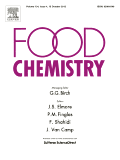
Food Chemistry
Transforming Insights into Culinary ChemistryFood Chemistry, published by Elsevier Science Ltd, is a leading international journal dedicated to the publication of high-quality research in the field of food chemistry. Established in 1976, this journal has made a significant impact in its realm, with an impressive 2023 impact factor and ranked Q1 in Analytical Chemistry, Food Science, and miscellaneous Medicine categories. It currently holds a remarkable Scopus ranking of #3 in Analytical Chemistry and #11 in Food Science, signifying its relevance and prestige among the top scholarly publications. With a wide scope that includes the chemistry of food composition, flavor, and safety, Food Chemistry serves as an essential resource for researchers, professionals, and students alike, offering insights and advancements in food analysis and technology. Access options may vary, and the journal is committed to disseminating innovative findings to foster knowledge and application in the dynamic field of food science.

International Food Research Journal
Fostering Excellence in Global Food ResearchThe International Food Research Journal, published by UNIV PUTRA MALAYSIA PRESS, serves as a pivotal platform for disseminating innovative research within the field of food science. With an ISSN of 1985-4668 and an E-ISSN of 2231-7546, the journal has successfully established its presence since its inception in 2007, converging its findings through 2024. This esteemed journal holds a Q3 ranking in Food Science, illustrating its valuable contributions to the field as demonstrated by its Scopus rank of 276 out of 389, placing it in the 29th percentile among its peers in Agricultural and Biological Sciences. Although it operates under a traditional publishing model, its academic integrity and focus on high-quality research ensure that it remains a vital resource for researchers, professionals, and students eager to explore advances in food technology, nutrition, and safety. By encouraging interdisciplinary collaboration and critical dialogue, the International Food Research Journal plays an essential role in shaping the future of food science research.

FOOD SCIENCE AND BIOTECHNOLOGY
Exploring the Intersection of Science and Culinary ArtsFOOD SCIENCE AND BIOTECHNOLOGY, published by the Korean Society of Food Science & Technology (KOSFOST), stands as a prominent peer-reviewed journal dedicated to advancing knowledge in the fields of food science, biotechnology, and applied microbiology. With ISSN 1226-7708 and E-ISSN 2092-6456, this journal serves as a pivotal platform for disseminating high-impact research from South Korea and beyond, reflecting a robust Q2 ranking in multiple categories including Applied Microbiology and Biotechnology, Biotechnology, and Food Science as of 2023. The journal's influence is further emphasized by its positions in various Scopus ranks, where it showcases a commendable percentile ranking in Agricultural and Biological Sciences and Biochemistry. Although access options remain limited, the journal’s objectives revolve around the publication of innovative research, fostering interdisciplinary collaboration, and facilitating the exchange of ideas among a diverse community of researchers, professionals, and students. Whether you are involved in food technology, microbial biotechnology, or nutritional sciences, FOOD SCIENCE AND BIOTECHNOLOGY are instrumental in shaping the future of these critical fields, propelling advancements that enrich our understanding of food systems and health.
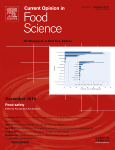
Current Opinion in Food Science
Transforming Food Science Through Critical DialogueCurrent Opinion in Food Science is a premier peer-reviewed journal published by ELSEVIER SCI LTD that focuses on the latest advancements and research in the domain of food science and technology. With its ISSN 2214-7993 and E-ISSN 2214-8000, this journal serves as a critical platform for researchers and professionals to share insights and opinions on emerging trends, innovations, and challenges faced in food science. The journal enjoys an impressive impact factor and ranks in the first quartile (Q1) in both Applied Microbiology and Biotechnology and Food Science, symbolizing its influence and reputation in the field. It is strategically located in the Netherlands and conducts its academic dialogue with a broad scope that includes essential topics in food safety, nutrition, and sustainable practices. Operating from 2015 to 2024, the journal has established itself as a critical resource for the global academic community, boasting excellent Scopus rankings—#9 out of 389 in Food Science and #6 out of 127 in Applied Microbiology and Biotechnology—indicating its high relevance and impact. Readers can look forward to insightful articles and comprehensive reviews that bridge the gap between fundamental research and practical application in the ever-evolving food science landscape.

JOURNAL OF THE JAPANESE SOCIETY FOR FOOD SCIENCE AND TECHNOLOGY-NIPPON SHOKUHIN KAGAKU KOGAKU KAISHI
Transforming Ideas into Culinary InnovationsWelcome to the JOURNAL OF THE JAPANESE SOCIETY FOR FOOD SCIENCE AND TECHNOLOGY-NIPPON SHOKUHIN KAGAKU KOGAKU KAISHI, a pivotal platform for the advancement of food science and technology. Published by the Japan Society for Food Science and Technology, this esteemed journal has been contributing to the field since 1995 and continues to publish innovative research and reviews that foster knowledge and collaboration among researchers, professionals, and students interested in food science. Although it currently holds a Q4 ranking within the Food Science category, the journal's commitment to disseminating valuable insights showcases its potential as a resource for emerging trends and applications in food technology. While it does not offer open access options, it maintains a rigorous peer-review process to ensure the quality of its content. As this journal progresses into its convergence years through 2024, it remains an essential resource for those passionate about exploring the intersections of food science and technology in Japan and beyond.
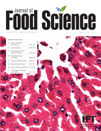
JOURNAL OF FOOD SCIENCE
Elevating Standards in Food Quality and SafetyJOURNAL OF FOOD SCIENCE, published by Wiley, is a premier journal dedicated to advancing the field of food science, bridging the gap between fundamental research and practical application. With an impressive impact factor reflecting its authoritative status, the journal is ranked in the Q1 quartile for Food Science in 2023 and boasts a Scopus ranking of #71 out of 389, placing it in the 81st percentile within Agricultural and Biological Sciences. First launched in 1936, the journal continues to serve as an essential platform for researchers, professionals, and students to disseminate innovative studies and reviews that address critical issues in food quality, safety, and technology. While not currently offering open access, its rigorous peer-review process ensures the dissemination of high-quality and impactful research. Researchers engaged in the vital disciplines of food science will find this journal indispensable for keeping abreast of cutting-edge developments in the field.